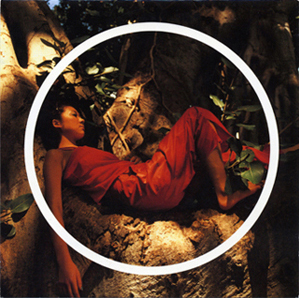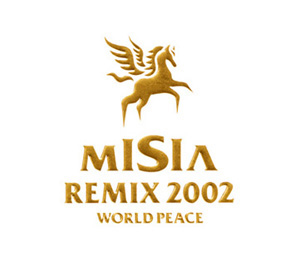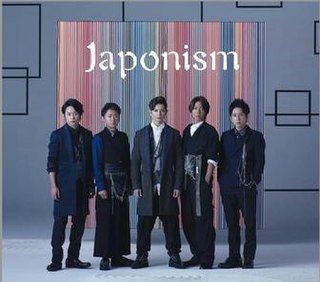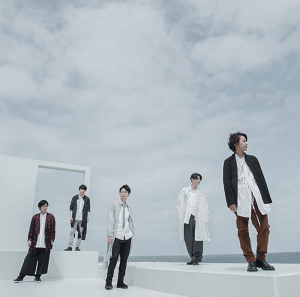
The discography of Japanese R&B singer Misia consists of nine studio albums, three compilation albums, one extended play (EP), one live album, six remix albums, twenty-six singles, twelve promotional singles, eighteen video albums and thirty-seven music videos. In 1997, Misia signed a recording contract with BMG Japan and joined the then up-and-coming talent agency, Rhythmedia. Under the sub-label Arista Japan, Misia released her first single, "Tsutsumikomu Yō ni..." in February 1998, followed by "Hi no Ataru Basho" in May. In June, her debut album, Mother Father Brother Sister, opened at number three on the Oricon chart. The album peaked at number one three weeks later and stayed in the top five for eleven consecutive weeks. Mother Father Brother Sister was certified double million and won a Japan Record Award for Best Album, as well as a Japan Gold Disc Award for Pop Album of the Year. In 2000, Misia's second studio album, Love Is the Message, debuted at number one and was certified double million. It won a Japan Record Award for Best Album and a Japan Gold Disc Award for Pop Album of the Year. The album spawned three top ten hits: "Believe," "Wasurenai Hibi" and "Sweetness." Misia's first remix album, Misia Remix 2000 Little Tokyo, was released three months later and shot to number one. It sold over 800,000 copies and is the second best-selling remix album of all time in Japan.

Mother Father Brother Sister is Misia's debut album, released on June 24, 1998. It debuted at #3 on the weekly albums chart with 330,660 copies sold. The album stayed in the Top 3 the next two weeks and on its fourth week, reached the top of the charts with 277,990 copies sold. The album remained in the Top 5 for eleven consecutive weeks and sold over 2.58 million copies in Japan alone. It won the award for Best Album at the 40th Japan Record Awards.

Misia Remix 2002 World Peace is Misia's second remix album, released on November 21, 2001. It sold 165,190 in its first week and peaked at #3. Misia Remix 2002 World Peace features Erick Morillo's first remix for a Japanese artist.

Misia Greatest Hits is Misia's first compilation album and last release with Arista Japan, released on March 3, 2002. It sold 587,210 copies in its first week and peaked at #1 for two consecutive weeks. Misia Greatest Hits was the highest selling compilation album of 2002. It is the 30th best selling compilation album and 90th best selling album overall of all time in Japan. The album includes an enhanced music video for the unreleased track, Amai Koibito, featuring Melonpan.

"Planetarium" is Ai Otsuka's tenth single, which was released on 21 September 2005. The single had great success and became Otsuka's second #1 hit on the Oricon charts, selling 316,425 copies. In 2005, Planetarium sold 215,114 copies, making it the #41 best-selling single of the year. However, it still charted into the next year and was the #99 best-selling single in 2006, selling 100,555 copies. Planetarium is her second best-selling single after "Sakuranbo."

Fuse of Love is the fifth studio album by Japanese recording artist Mai Kuraki. It was released on August 24, 2005, over two years after If I Believe.

Fairy Tale is the third studio album by Japanese recording artist Mai Kuraki. It was released on October 23, 2002 under Giza Studio label.

If I Believe is the fourth studio album by Japanese recording artist Mai Kuraki. It was released on July 9, 2003, only nine months after Fairy Tale.

Wish You the Best is the first compilation album by Japanese recording artist Mai Kuraki. It was released on January 1, 2004. The compilation won Pop Album of the Year at the 19th Japan Gold Disc Awards.

Just Ballade is the ninth studio album by Japanese singer Misia. It was released on December 16, 2009 by Ariola Japan, marking Misia's first album release under the label. The album yielded seven singles, "Yes Forever" and "Yakusoku no Tsubasa", released in 2008, the digital exclusive "Sukoshi Zutsu Taisetsu ni", the double A-side single "Ginga" / "Itsumademo", "Aitakute Ima", and lastly "Hoshi no Yō ni...", released on the same day as the album. Just Ballade was certified Gold by the Recording Industry Association of Japan.

"Aitakute Ima" is a song recorded by Japanese singer Misia, from her ninth studio album, Just Ballade. It was released by Ariola Japan as the album's sixth single on November 18, 2009. "Aitakute Ima" is the theme song to the first season of the TBS drama series Jin.

Huma-rhythm is the sixth studio album by Japanese singer Hitomi. It was released on January 30, 2002, through Avex Trax. Following the highly successful Love Life (2000), Hitomi began to notice a "disconnection" between her perception as a public figure and her true self in private. She sought to pursue the core of her being; articulating "our dissatisfaction with society" yet wanting to "live happily as [herself]".
"Romance no Kamisama" is a song recorded by Japanese singer-songwriter Kohmi Hirose, from her third studio album, Success Story. It was released on December 1, 1993 by Victor Entertainment as the album's second single. It is Hirose's most successful single to date, selling two million copies in Japan alone. Romance no Kamisama was also the first of Hirose's songs to be featured by the Alpen company, a Japanese winter sports store, in their winter advertisements, resulting in the Japanese public affectionately naming Hirose the "Queen of Winter".

Misia no Mori: Forest Covers is the first covers album by Japanese singer Misia. It was released by Ariola Japan on December 14, 2011. The album consists of cover versions of songs by soul musicians, including Michael Jackson, Stevie Wonder, Marvin Gaye, among others, reworked Christmas standards and one newly recorded original song by Misia.

Super Best Records: 15th Celebration is the second greatest hits album by Japanese singer Misia. It was released to commemorate Misia's 15th anniversary as a recording artist by Ariola Japan on February 20, 2013, one day shy of her actual 15th anniversary. The three-disc set was released in Blu-spec CD2 format and each disc was remastered by a different music engineer. The compilation includes four reworked tracks, the singles "Koi wa Owaranai Zutto", "Deepness" and "Back in Love Again", and the new song "Holiday", which was released as a promotional single for the album.

Japonism is the fourteenth studio album of the Japanese idol group Arashi. The album was released on October 21, 2015 under their record label J Storm in three editions: a first press/limited edition, a Yoitoko limited edition, and a regular edition. The first press edition comes with an 84-page photo lyrics booklet and bonus DVD with the music video and making-of for the album's lead track, "Kokoro no Sora". The Yoitoko limited edition comes with a 32-page lyrics booklet, and the regular edition comes with a 36-page lyrics booklet. The album sold over 820,000 copies in its first week and topped the Oricon charts for two consecutive weeks. With more than 1,000,000 copies sold, the album was certified for Million by the Recording Industry Association of Japan (RIAJ). On December 23, 2015, Oricon ranked Japonism as the best-selling album of 2015 in Japan. On February 27, 2016, Japonism was awarded Album of the Year in the 2016 Japan Gold Disc Awards.

Love Bebop is the twelfth studio album by Japanese singer Misia. It was released on January 6, 2016, through Ariola Japan. The title, which is synonymous with love freestyle, was inspired by the evolving LGBT movement in Japan, leading Misia to draw a parallel between the growing societal recognition for all forms of love and the various messages of love depicted on the album. On the album's eponymous title track, Misia quotes former American president Barack Obama, who declared "love is love" in a speech given in the aftermath of the Supreme Court of the United States's landmark decision to legalize same-sex marriage nationwide. The album yielded five singles, "Shiroi Kisetsu" / "Sakura Hitohira", "Orphans no Namida" and the digital exclusive double A-side single "Nagareboshi" / "Anata ni Smile :)".

Are You Happy? is the fifteenth studio album of the Japanese idol group Arashi. The album was released on October 26, 2016 under their record label J Storm in two editions: a first press/limited edition and a regular edition. The regular edition comes with a 36-page lyrics booklet and the limited edition comes with an 80-page photo lyrics and a bonus DVD with the music video and making-of for "Don't You Get It?". The album sold over 636,000 copies in its first week and topped the Oricon charts. With more than 720,000 copies sold, the album was certified for Triple Platinum by the Recording Industry Association of Japan (RIAJ). It was released digitally on February 7, 2020.

Untitled is the sixteenth studio album by the Japanese idol group Arashi. The album was released on October 18, 2017 under their record label J Storm in two editions: a first press/limited edition and a regular edition. With more than 750,000 copies sold, the album was certified for Triple Platinum by the Recording Industry Association of Japan (RIAJ). It was released digitally on February 7, 2020.

Enka is the enka cover album by Japanese singer Akina Nakamori. It was released on 27 June 2007 under the Universal Music Japan. It is Nakamori's fourth cover album.




















